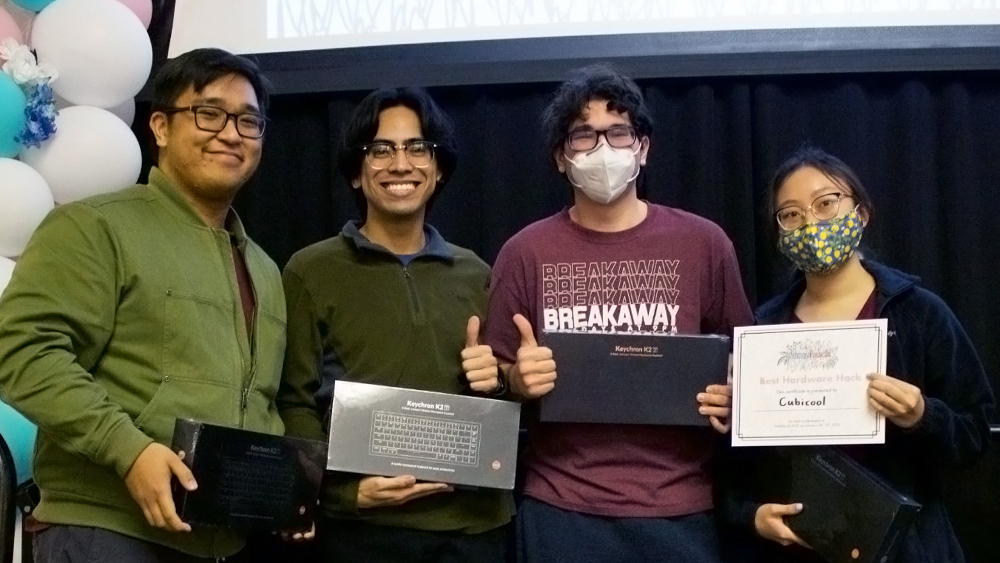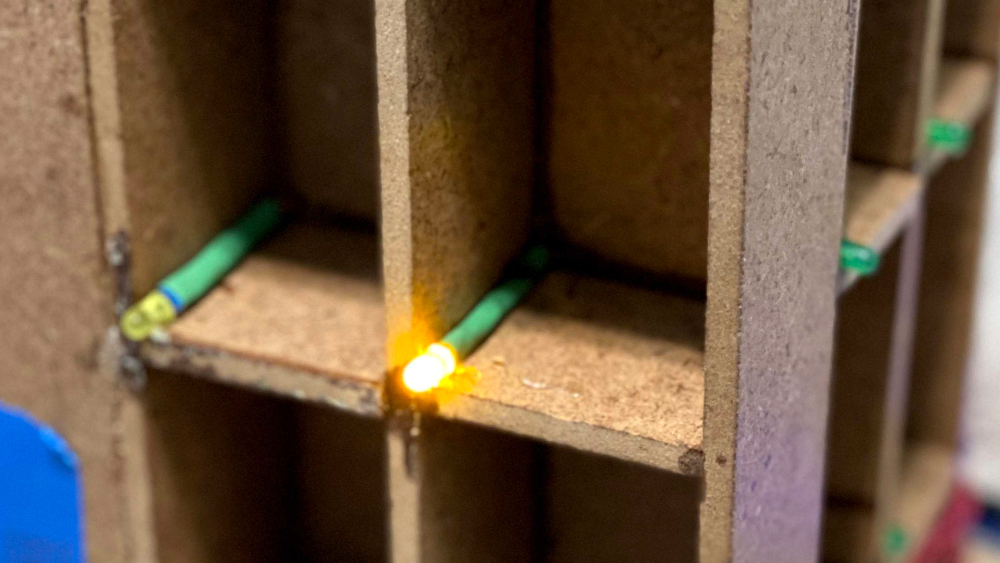
The Cubicool team display their prizes and certificate for earning the Best Hardware Hack award in TAMUhack. From left: Dean Vicerra, Carlos Espinal Jr., Gael De Asis Arriaga and Lisa Nguyen. |
Image: Courtesy of Lisa Nguyen.
Four students from the Department of Engineering Technology and Industrial Distribution at Texas A&M University won the Best Hardware Hack award for their team effort to conceptualize and design Cubicool, an innovative way to store, organize and locate where different items are.
Lisa Nguyen '22, Gael De Asis Arriaga Padrón '23, Carlos Espinal Jr. '22 and Dean Vicerra '22 worked together to create a physical system with motors and sensors.
The inspiration for Cubicool came from Espinal, who noticed they were constantly losing small items. And whenever they tried to find an item, they would spend hours looking through drawers and cabinets, sometimes with no luck.
That was when the idea of organizing and tracking where items were stored came in the form of Cubicool.
"We implemented hardware like Arduino and LEDs, which we learned to use with Raspberry Pi," said Espinal, a multidisciplinary engineering technology student. "We used a backend to a website, and by interfacing with the website, you could type in an item that you want it to store or retrieve. The system would classify that item and locate it by spinning the box to face the item toward you. A straightforward storage and retrieval system."
The nature of the competition was to prepare an idea and design a project within 24 hours.
There were various categories that the team could compete in, and the Cubicool team chose to compete in the best hardware hack.
Lisa Nguyen '22, Gael De Asis Arriaga Padrón '23, Carlos Espinal Jr. '22 and Dean Vicerra '22 worked together to create a physical system with motors and sensors.
The inspiration for Cubicool came from Espinal, who noticed they were constantly losing small items. And whenever they tried to find an item, they would spend hours looking through drawers and cabinets, sometimes with no luck.
That was when the idea of organizing and tracking where items were stored came in the form of Cubicool.
"We implemented hardware like Arduino and LEDs, which we learned to use with Raspberry Pi," said Espinal, a multidisciplinary engineering technology student. "We used a backend to a website, and by interfacing with the website, you could type in an item that you want it to store or retrieve. The system would classify that item and locate it by spinning the box to face the item toward you. A straightforward storage and retrieval system."
The nature of the competition was to prepare an idea and design a project within 24 hours.
There were various categories that the team could compete in, and the Cubicool team chose to compete in the best hardware hack.

An LED light shows where an item would be located inside the Cubicool storage unit. |
Image: Courtesy of Carlos Espinal Jr.
"There were different things we could implement to the project to classify into other categories and subgroups," said Arriaga Padrón, an electronic systems engineering technology student. "We wanted to use Google Cloud API to analyze how many items were in a specific cubby area. And then tell you what those items were and the amount of that item the system found."
Each member of the team focused on a different aspect of the project.
Espinal led the backend software development. "I was creating the logic for interfacing with the hardware by coding how the system would respond to each scenario," Espinal said.
"The project design and logo creation were up to me," said Nguyen, an electronic systems engineering technology student. "I built the front end using HTML for the graphical interface for the user. Skills I learned from Dr. Logan Porter in their introductory class."
Vicerra, a multidisciplinary engineering technology student, focused on hardware components, motors, sensors, LEDs and Raspberry Pi.
"I worked on implementing the Google Cloud API, as well as general help with debugging the HTML with Lisa on the front end side of things," Arriaga Padrón said. "The courses I took with Dr. Byul Hur prepared me to compete in TAMUhack. Dr. Hur taught us how to code and how different communication protocols are used to store different sensors and information."
"Many of the classes we take in electronic systems engineering technology and multidisciplinary engineering technology gave us the confidence we needed to go into this competition," Espinal said. "They taught us how to code and interface with various sensors and actuators. We applied all the skills we learned in those classes to our project."
The real-world applications of Cubicool could be in the industrial sector by automating items in a warehouse where they can be tracked and stored, and a robot could retrieve and send them wherever they need to go.
"We are planning to compete again in TAMUhack 2023," Nguyen said. "We look forward to testing ourselves and our skills while competing against different schools and people from around Texas and out of state."
Each member of the team focused on a different aspect of the project.
Espinal led the backend software development. "I was creating the logic for interfacing with the hardware by coding how the system would respond to each scenario," Espinal said.
"The project design and logo creation were up to me," said Nguyen, an electronic systems engineering technology student. "I built the front end using HTML for the graphical interface for the user. Skills I learned from Dr. Logan Porter in their introductory class."
Vicerra, a multidisciplinary engineering technology student, focused on hardware components, motors, sensors, LEDs and Raspberry Pi.
"I worked on implementing the Google Cloud API, as well as general help with debugging the HTML with Lisa on the front end side of things," Arriaga Padrón said. "The courses I took with Dr. Byul Hur prepared me to compete in TAMUhack. Dr. Hur taught us how to code and how different communication protocols are used to store different sensors and information."
"Many of the classes we take in electronic systems engineering technology and multidisciplinary engineering technology gave us the confidence we needed to go into this competition," Espinal said. "They taught us how to code and interface with various sensors and actuators. We applied all the skills we learned in those classes to our project."
The real-world applications of Cubicool could be in the industrial sector by automating items in a warehouse where they can be tracked and stored, and a robot could retrieve and send them wherever they need to go.
"We are planning to compete again in TAMUhack 2023," Nguyen said. "We look forward to testing ourselves and our skills while competing against different schools and people from around Texas and out of state."